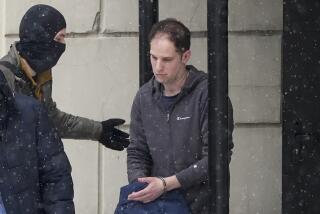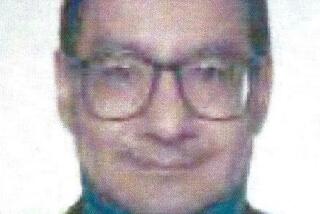Arthur J. Walker dies at 79; sold classified documents to Soviets
Arthur J. Walker, a conspirator in one of the biggest U.S. spy cases since World War II, was a surprisingly trusting soul.
When FBI agents wanted to talk to him in 1985 after arresting his brother John on suspicion of espionage, Walker voluntarily chatted, over several sessions, for a total of 32 hours — without a lawyer.
When a prosecution witness at Arthur’s trial had a hard time identifying him in a Virginia courtroom, he helpfully raised his hand. After all, he had been wearing a hairpiece when the witness last saw him.
And even after U.S. District Judge J. Calvert Clarke Jr. took all of 16 minutes to convict him of espionage, Walker asked his astonished attorney, “What do you think, maybe a two-year suspended sentence? I won’t have to go to prison, will I?”
He was given a life term, but under federal sentencing guidelines that were stiffened after his conviction, he was eligible for parole. Another hearing was to be held next month.
Walker, who made $12,000 for selling classified documents to Soviet agents through his brother, died July 5 in a federal prison in Butner, N.C. He was 79.
His death was confirmed by the Federal Bureau of Prisons. No cause was disclosed.
John Walker, who is incarcerated in the prison where his brother died, is said to have throat cancer. He is to be released next May, according to federal authorities.
When the family espionage ring was uncovered, John was cast by authorities as its amoral mastermind, a manipulator who got his son Michael, his older brother Arthur and his best friend Jerry Whitworth to join him.
John Walker started spying in 1967 during his Naval career and sold the KGB “vital U.S. cryptographic secrets that had allowed Russian agents to decipher approximately one million coded Navy dispatches,” wrote Pete Earley, author of “Family of Spies: Inside the John Walker Spy Ring.”
By comparison, Arthur, a retired Navy lieutenant commander, seemed to be a small fish. He was convicted of stealing two sets of documents, both with the government’s lowest classified designation, from a Virginia defense contractor that employed him as an engineer. He later said he used the windfall for a new set of brakes, a gas grill and a toupee.
He also gave some of the money to his brother to repay a business loan. Bailing Arthur out after the failure of his car stereo business, John urged him to take a defense job for its proximity to military secrets.
“John didn’t say, ‘Hey Art, you want to be a spy?’ He just planted a few seeds,” Arthur told Earley.
After the trial, prosecutors said Arthur may have been the group’s real ringleader, hiding his true role under a cloak of bumbling naivete. They presented no evidence for that assertion, which biographer Earley called “nonsense.”
Looking back on the case, Arthur Walker’s attorney, Samuel Meekins Jr., said he had never been able to decide whether his former client was “a spy or a sap.”
Walker had appeared, unsummoned, before a Baltimore grand jury after driving his wife, Rita, there for her brief, tearful testimony.
“Would a real espionage agent confess to a grand jury?” Meekins wondered in an essay posted on his Virginia Beach law firm’s website.
On the other hand, Meekins wrote, Arthur Walker was “virtually unnoticeable in a room. He was a very low-key family man whose major involvement was with his local civic league. He had a sound naval career, but it was not particularly distinguished either. He had a low-level security job with a government contractor. No one would think of Arthur as a spy.”
Walker admitted to FBI agents that he photographed documents but insisted that they were worthless. He said he chose those particular items only to convince his brother that he had no access to anything important.
The documents concerned repairs on a class of Navy amphibious assault ships and detailed plans for responding to emergencies on the Blue Ridge, a communications ship.
Testifying during Walker’s trial in Norfolk, Va., a Navy official described the documents as “a Bible for sabotage.” Walker did not testify, nor did any witnesses appear on his behalf. He asked that his case be heard only by a judge, fearing backlash from jurors in a region with a huge Navy presence.
Born in Washington, D.C., in 1934, Arthur James Walker grew up in Richmond, Va. and West Scranton, Pa. In high school, he played football and was named the most popular student. He enlisted in the Navy in 1953 and retired in 1973.
He and his wife had two daughters and a son. Information on surviving family members was not immediately available.
Twitter: @schawkins
More to Read
Start your day right
Sign up for Essential California for the L.A. Times biggest news, features and recommendations in your inbox six days a week.
You may occasionally receive promotional content from the Los Angeles Times.







